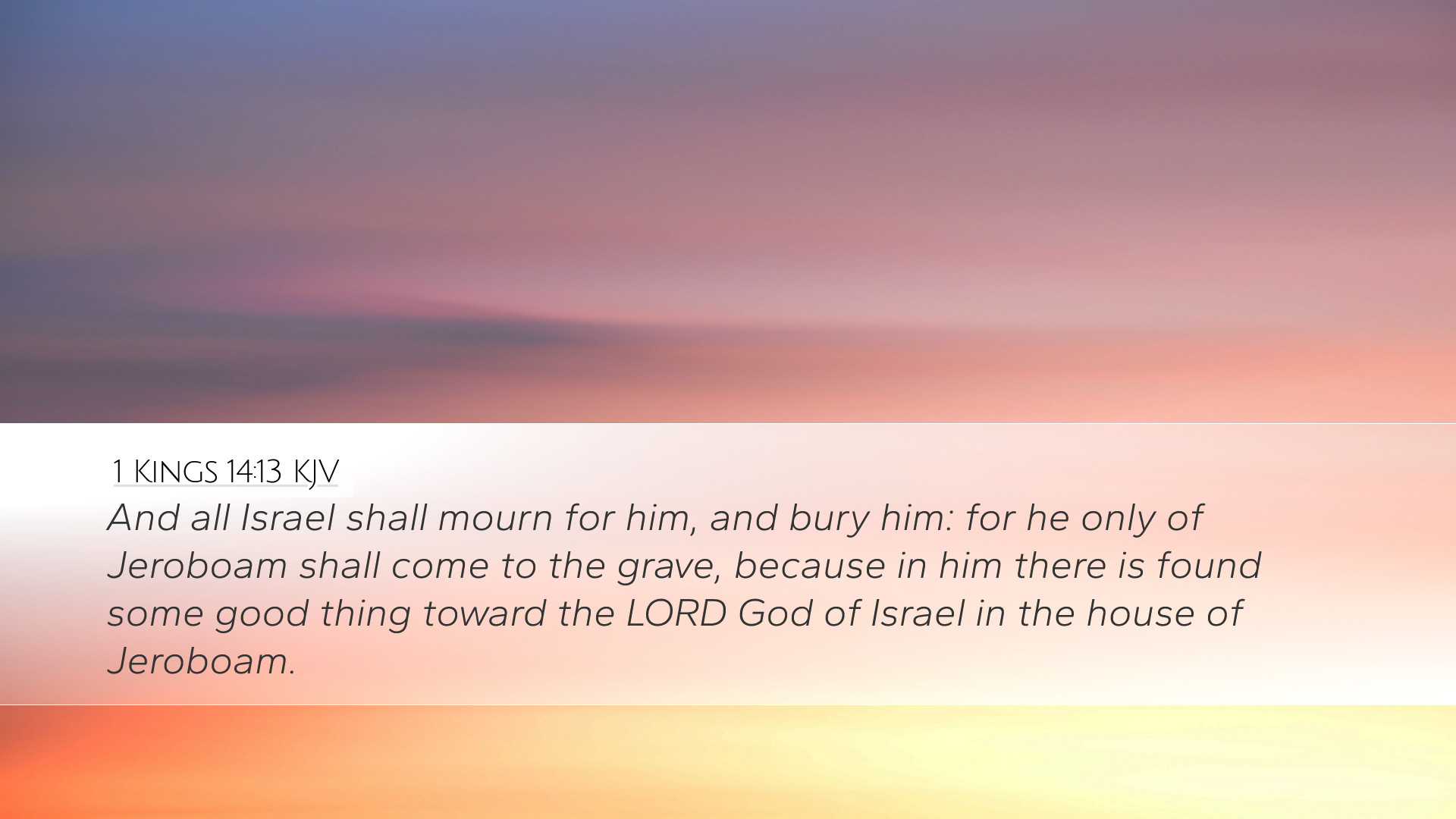Commentary on 1 Kings 14:13
Verse Text: "And all Israel shall mourn for him, and bury him: for he only of Jeroboam shall come to the grave, because in him there is found some good thing toward the Lord God of Israel in the house of Jeroboam." (1 Kings 14:13, KJV)
Introduction
This verse is part of a larger narrative that highlights the fate of Jeroboam's family and the righteous judgment of God in contrast to the evil practices of Jeroboam himself. The verse stands out by marking the distinction between the ungodly lineage of Jeroboam and the small remnant of goodness found in his son Abijah. This commentary aims to explore the theological implications and moral lessons embedded in this verse through the insights of revered biblical commentators.
Insights from Matthew Henry
Goodness Recognized: Matthew Henry emphasizes the remarkable observation that Abijah is noted for the goodness found in him, contrasting sharply with the evil pursuits of his father, Jeroboam. Henry notes that this acknowledgment by God is significant, showcasing God's grace amidst widespread corruption. It hints at the possibility of a righteous remnant even in the context of a family that largely turns away from Him.
National Mourning: According to Henry, the mourning of all Israel for Abijah’s death underscores his unique standing among Jeroboam's lineage. The depth of this national grief signifies that the people recognized and perhaps even yearned for the goodness that Abijah represented, despite his association with a largely corrupt house. This reflects the notion that even within a community marked by sin, the presence of righteous individuals can elicit grief and loss when they pass away.
Insights from Albert Barnes
Divine Judgment and Mercy: Albert Barnes sheds light on the duality of judgment and mercy evident in this passage. He posits that though Jeroboam’s dynasty faced divine retribution due to their persistent idolatry, Abijah's commendable character was spared from the harsh fate of his lineage. Barnes reflects on the mercy of God that allows for grace to be found even in the most unworthy circumstances, teaching a profound lesson about divine assessment of one's life.
Encouragement for Righteousness: Barnes further encourages readers to consider the implications of individual righteousness in a collective context. Abijah’s potential to bring about a shift in the trajectory of Israel’s spiritual heritage serves as an encouragement to believers today. The passage illustrates that even a single righteous person can provide a glimmer of hope and a possibility for future redemption, emphasizing the importance of personal righteousness in influencing community and national faith.
Insights from Adam Clarke
Historical Contextualization: Adam Clarke provides a meticulous historical context to the verse. He discusses the political climate of Israel at the time and the significance of Abijah's behavior in light of his father's transgressions. Clarke argues that understanding the societal impacts of Jeroboam's idolatry enhances the appreciation for Abijah’s relatively righteous standing and subsequent mourning among the people.
Legacy and Influence: Clarke emphasizes the long-lasting influence of Abijah’s character on both his immediate family and the nation of Israel. His legacy, though brief, serves as a reminder of the potential for holiness to counteract and transcend the pervasive influence of sin. Clarke's observations instill a reflective consideration regarding the definitions of success and legacy in the eyes of God as opposed to the world.
Theological Implications
- The Nature of Righteousness: The verse illustrates that true righteousness and goodness can exist in adverse contexts, providing comfort to believers who may feel surrounded by sin.
- God's Sovereignty in Judgment: God's recognition of Abijah’s goodness amidst judgment upon Jeroboam’s house demonstrates His sovereign control over the moral state of humanity and the destinies of nations.
- Hope and Redemption: The mourning for Abijah signifies the hope that remains for Israel, suggesting that even amidst judgment, there is always an opportunity for redemption through genuine righteousness.
Moral and Practical Applications
- Individual Responsibility: Believers are reminded of the importance of cultivating personal holiness and goodness, as individual lives can have significant impacts on larger communities.
- Recognition of Righteousness: It serves as a call to recognize and mourn the loss of righteousness in our environments, advocating for the value of lives lived in accordance with God’s will.
- Impact of Leadership: The passage urges leaders and future generations to consider the legacies they wish to leave, emphasizing the importance of righteousness over power.
Conclusion
1 Kings 14:13 serves as a poignant reflection on the complexities of righteousness and judgment within familial and national contexts. The commentary from Matthew Henry, Albert Barnes, and Adam Clarke highlights the profound lessons encapsulated in this verse, offering timeless truths for pastors, students, theologians, and scholars. Through the interplay of grief, legacy, and divine recognition of goodness, believers today are encouraged to seek righteousness, recognize its impact, and remain hopeful in the midst of moral decline.


